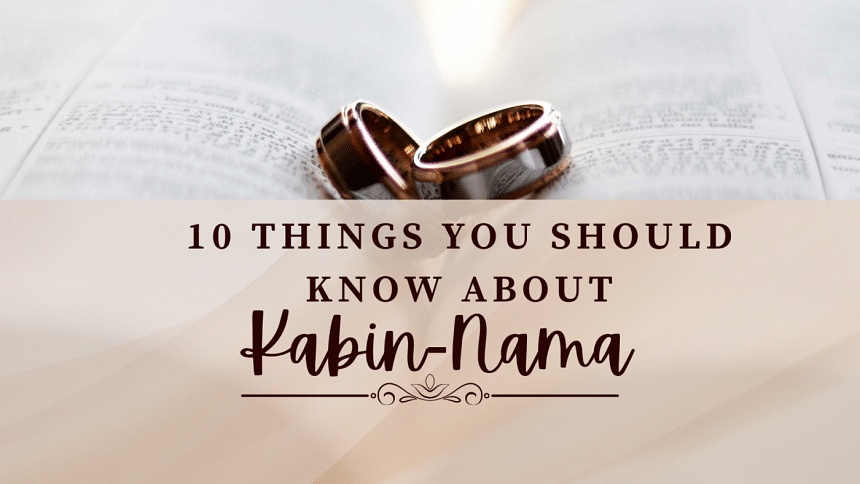10 things you should know about Kabin-Nama

The concept of marriage has persisted through the millennia in several civilisations and countless societies. Through the ages, lots have changed the idea of unison and have been amended to allow both husband and wife to coexist without any bars holding them back. Nowadays, marriage is considered a legal contract, making Kabin-Nama (also referred to as Nikah Nama) the rule book. The Kabin-Nama form is drafted so that a couple can set the terms and conditions of the marriage according to their preferences. The form allows each couple to set boundaries and terms of their own accord, creating a unique Kabin-Nama. However, in practice, the Kabin-Nama is treated as a terms and conditions page that needs to be ticked, where the couple is rarely consulted before drafting the most important contract of their lives. Let's discuss 10 things you should know about Kabin-Nama.
Dower
Customarily, the part of the dower (commonly known as Den-Mohor) is given a lot of priority during the marriage, and religiously, the dower is bestowed as a token of security for the bride. The amount of dower is recommended to be set considering family practices, the groom's income, and the family's decision. Dower can be tied to some conditions to give monetary value to fulfilment or failure to meet a specific term. The role of the dower can extend beyond what is practised.
Payment of Dower
Along with the amount of dower, the Kabin-Nama sets the terms of when and how the dower can be paid. On top of that, whether the dower is being paid in the form of any property or jewellery, how much is due, and whether that amount is to be paid in instalments or at once. All these terms are to be mentioned in a Kabin-Nama.
Delegation of the Right to Divorce
The Kabin-Nama has a section where the wife may have the right to divorce delegated, using which the wife can exercise her rights to dissolve the marriage as per the Muslim Law Ordinance- 1961. The delegation can be conditional, i.e., in case of infidelity.
Withholding Husband's Right to Divorce
In a Muslim marriage, the husband has the ultimate right to divorce; however, the husband's right can be limited by customisation. Conditions can be introduced to the contract, increasing the security of the marriage. Then again, the conditions will totally depend on what the couple desires.
Advocates for the couple
The Kabin-Nama allows the couple to have "Ukil Baba," who will advocate for the couple's rights and work to resolve any dispute that may arise in their conjugal life.
Witnesses
The Kabin-Nama requires at least two witnesses from both sides to be present at the time of the contract being signed, and the Kabin-Nama also contains the contact details of the witnesses. The concept behind this practice is that, in case of a dispute, the witnesses can act as neutral parties to determine the facts.
Language
The Kabin-Nama in Bangladesh is written in Bangla, and upon payment and application, it can be translated into any language that the married couple requires.
Declaration of previous marriages
A bride is required to share any details of any marriages she had prior. Moreover, she is required to share the dissolution mode of marriage, whether by divorce, death, or any other mode.
Council's Permission in case of Polygamy
According to Muslim personal law, a man can marry up to four women. However, a man requires written permission from the arbitration council in writing. The Kabin-Nama needs to contain the details of the permission acquired from the arbitration council. Whoever gets married without such consent will be subjected to punishment.
Other Terms
The Kabin-Nama has a section where the couples insert any terms they want to add to the marriage. This section provides a couple with the liberty to legalise the commitment they give each other. Using this opportunity, a couple can design a roadmap about their lifestyle, household, social life, responsibility to each other, and many more.
Marriage is one of the most important contracts in a person's life. The law has a pre-drafted format that can be used to construct marriage by planning and drafting the terms of the marriage. Moreover, the draft may begin a conversation among the couple to help them anticipate the path ahead and plan accordingly.

 For all latest news, follow The Daily Star's Google News channel.
For all latest news, follow The Daily Star's Google News channel. 








Comments